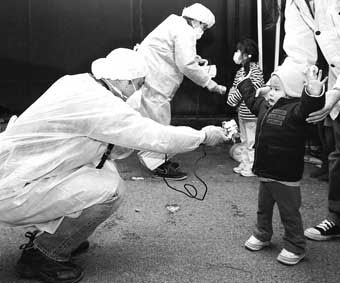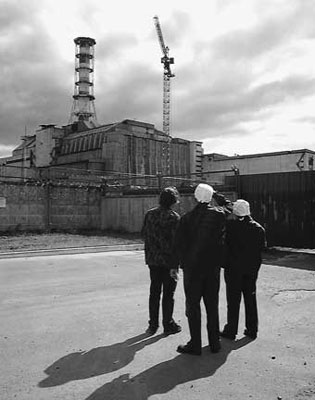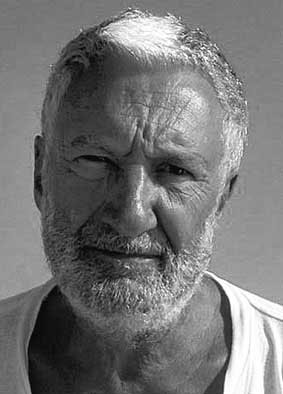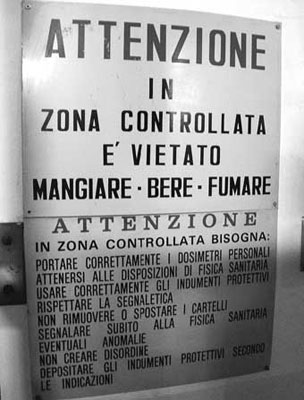Many people wonder why a story that seemed closed and forgotten as the current nuclear energy is able to return to our country. Nothing new you might say, is precisely because of our country gather to discuss events that seemed acquired once and for all (anti-fascism, the Resistance, the Constitution itself), through the incomprehensible as it is by repeated memory lapses . However in this case it's forgotten story, but not closed since, at least formally, the 1987 referendum was not about the acceptance or rejection of nuclear power. According to the Italian Constitution, in fact, the referendum is only repeal and more with certain restrictions: For example, you can not repeal laws or parts of laws ratifying international treaties. In fact, were collected in 1980 (and approved by the Supreme Court) signatures for the repeal of the law August 2, 1975 (Regulations on the location of nuclear power stations and electricity production and use) with the intent to cancel the nuclear power in Italy . But the Constitutional Court in 1981 declared inadmissible because the question deemed relevant to the international treaty establishing EURATOM. Subsequently, in 1986, gathered the signatures of three different questions that were combined in fact the impediment to construct and operate nuclear power plants in our country. The clear victory of the Yes (80%) led the government Goria, then in office, close to existing nuclear power plants and to establish a moratorium of 5 years, that only the indolence of the political class has continued over time, until the current government has stopped approving two interrelated measures: the "development" law n.99/2009 Decree 31/2010 and the decree called for the selection of sites. But if this was the formal procedures with which they wanted to bring back nuclear power in Italy, there are different considerations to be done to explain, or at least understand, because it was politically possible, despite the clear opposition of the population expressed in the referendum of 1987 . Two aspects on which to dwell: a different approach to the issue of movement of nuclear ambiguity of the national policy framework.
 |
Caorso atomic power plant. |
 The movements and the nuclear issue
The movements and the nuclear issue
 As the outcome of that referendum was influenced by the Chernobyl disaster, the fact is that the former anti-nuclear movement was formed and expressed before the accident at Three Mile Island (1979) because the son of the great movements of the 70 season that, well beyond the nuclear postulated a structural change in society as a whole. No coincidence that the epic of Montalto di Castro, which led to the crackdown by the events of 1986, was started on 21 March 1977 with the peaceful invasion of Pian dei Cangani by 20,000 "independent", while the spectrum of dispute Antinuclear was materializing in Europe: in Germany Brokdorf and Biblis, then Creys-Malville (France) against the fast reactor Superphénix 31 July 1977 where he was killed by police Vitalone Michel, and again in Tudela (Spain) with the international day of struggle against the nuclear 3 June 1979 where she was killed the militant environmentalist Estal of Gladys Ferren.
As the outcome of that referendum was influenced by the Chernobyl disaster, the fact is that the former anti-nuclear movement was formed and expressed before the accident at Three Mile Island (1979) because the son of the great movements of the 70 season that, well beyond the nuclear postulated a structural change in society as a whole. No coincidence that the epic of Montalto di Castro, which led to the crackdown by the events of 1986, was started on 21 March 1977 with the peaceful invasion of Pian dei Cangani by 20,000 "independent", while the spectrum of dispute Antinuclear was materializing in Europe: in Germany Brokdorf and Biblis, then Creys-Malville (France) against the fast reactor Superphénix 31 July 1977 where he was killed by police Vitalone Michel, and again in Tudela (Spain) with the international day of struggle against the nuclear 3 June 1979 where she was killed the militant environmentalist Estal of Gladys Ferren.
With the disappearance of the general drive for renewal, the nuclear issue has lost its paradigmatic meaning of “capitalist energy use”, consistent and coherent at the wider capitalist mode of production, reducing it to dispute the use of scientific-technological different sources of energy within the old logic of development, although the magazine in terms of “sustainability”. Thus, while the controversy nuclear / renewable ended up diverting the attention that you last use of energy, just as it was considered that the ecological thought and anti-development could solve the distortions introduced by the capitalist society without calling into question its foundations (ownership, profit) and while he preached an ethic of consumption and production, it welcomes the free energy market by dismantling the public service and promoting the baffling “Italian road to renewables” yesterday with the CIP 6 ( resolution of the Interministerial Price Committee, adopted April 29, 1992, in which prices are set incentives for electricity produced from plants using renewable and "assimilated"), now with wind and solar incentives indiscriminate.

 No rules, we are Italians
No rules, we are Italians
After 1987, the political class, the vast majority was not opposed to the use of nuclear energy, he made the best of a bad forgetting that the closure of nuclear power in Italy left unresolved the issue of waste, moreover, never addressed even before the referendum. As managers of the Italian nuclear deal have always avoided this problem in the past in the hope that technology would solve it, as did the governments of the referendum after freezing in fact the situation at the time when nuclear power stations ceased to function.
 |
Chernobyl power plant. |
For over ten years were not taken steps towards nuclear waste, even with the reorganization of CNEN in ENEA (National Agency for New Technologies, Energy and Environment) to avail disappeared, the only supervisory authority that had jurisdiction on nuclear matter, and its functions were transferred to the ANPA, which later became ARPA. Subsequently, the Bersani decree of 1999 which liberalized the electricity market, it was determined that activities related to nuclear decommissioning, closing the fuel cycle and waste were concentrated in the arrangement of Sogin (Nuclear Plants Management Company) whose first tasks were outlined in the document "strategic directions for the management of the outcomes of nuclear power" transmitted to the Parliament by the Minister of Industry on 21 December 1999 and further specified by a decree of the Ministry in May 2001.
These two measures, as well as leaving unsolved the problem of the nuclear control (not reconstituted after the disappearance of the dispute), assigned to Sogin also preparing the legal framework within which to carry out the activities of which he was registered holder, in all discrepancies principles of nuclear safety, but that separate and distinguish the two functions, with the further contradiction to invest Sogin of two contradictory tasks: to produce the release of nuclear energy and at the same time manage the "maintenance and updating of scientific and technological knowledge in the field of nuclear power, "as required for the document addresses the strategic management of the outcomes of nuclear power.
The Italian approach to radioactive waste management thereby repeating an old but proven method of government: let things rot and then impose decisions of convenience in the wake of the emergency. In fact, in 2001, after the September 11 attacks, was named president of Sogin the general Carlo Jean and then in 2003 - coinciding with the beginning of military operations in Iraq - Berlusconi declares a state of emergency in relation to nuclear disposal of radioactive waste located in five regions (Lazio, Campania, Emilia Romagna, Piedmont and Basilicata) and General Carlo Jean, while remaining president of Sogin, was appointed Commissioner to the refuse. It is a fact unprecedented in the history of the Republic because for the first time an administrative act of government (the state of emergency for the disposal of radioactive waste that affects five regions) is transformed into a military-political choice for the whole country. The turning point is evident even in the text of the decree Scanzano (later modified as a result of the protest of local people) with which Berlusconi had announced plans to build a national repository in the Basilicata region for nuclear waste, which in art. 1 is defined as "the work of military defense." Therefore a precise address that marks a turning point in relations between citizens and institutions and between different functions of the state: from "civil administrator of public affairs" to "Lieutenant supreme" which has a military power, arrogating executive (Council of Ministers) the final decision on the construction of a work, whatever the views expressed by local authorities. Concept taken by the Prodi government in 2008 also that with the Legislative Decree 16 February 2008 introduced the possibility to exclude from any environmental assessment that works - in the opinion of the executive - are considered works of national defense, on which is affixed to the secret status.
 |
Giorgio Ferrari |
 The unlikely renaissance of the Italian nuclear
The unlikely renaissance of the Italian nuclear
These are the harbingers of the new Italian nuclear program that Berlusconi (returned to power in 2008) will announce first Italians with a memorandum of understanding between Italy and France and then a collaboration agreement with Enel-EDF to build 4 power plants in Italy from 1600 MW EPR each, Areva design. A program improvised, immersed in a regulatory environment and industrial inadequate to ensure reliability and safety for future nuclear facilities, given that over the past 20 years were dismantled or sold to foreign companies the skills and capabilities of the electromechanical sector nationally. There is no doubt that the nuclear know-how, firmly in the hands of French companies or American, will be acquired abroad without any benefit for the Italian companies whose participation in the construction work will be confined to civil works.
 |
A sign inside the Caorso plant. |
As regards the exercise of power, once the pride of the old public Enel, together with the personnel have retired the criteria (and their structures) that oversaw the management of nuclear installations, personnel qualification, optimization fuel cycle, safeguards management, quality assurance and other specific nuclear activities that can not be improvised typically overnight. Finally, fatal, for the credibility of the program, the unpreparedness of the human factor of any level, because in all these years, industries and governments (of any color) have not spent any money in research and education (university and non) which indeed has been the subject of memorable cuts in funding.
Even more worrying is the framework outlined by the new laws on nuclear safety which, formally, are aimed at establishing criteria and procedures for the location of nuclear facilities (power stations, fuel depots and factories), even before the Government has established what are the criteria and procedures that govern the design, construction and operation of such systems: namely that the IAEA rules and the two international Conventions (1994 and Nuclear Safety of the fuel-waste in 1997) is called the legal framework. This set of laws, regulations and technical standards, and in Italy it is quite deficient as consisting of documents dating back more than 20 years ago (technical guides of the CNEN, never updated) and that even at the time of the creation of Montalto di Castro , forcing us technicians in the industry to make extensive use of legislation to use. Laws passed by insistently emerges the need for the authorization process for the construction of new plants is as fast as possible, even at the expense of safety and autonomy of local decision-making powers which are deprived of power by the executive. It stipulates that the Agency for Nuclear Safety Authority (ASN) to conduct the technical appraisal for the certification of the sites within 30 days of the request and, more importantly, it requires to carry out the licensing, ie the complex examination to assess in detail the design and operation of the entire system in just 12 months when in use the NRC (Security Agency) that nobody would dream of imposing something, it takes no less than three years. If we consider that the ASN must also complete the technical appraisal for the construction and operation of the national repository for nuclear waste in just 12 months, when other countries took up to 10 years, we realize how big the improvisation and incompetence of those who launched this program.
In this context, already fragile and smoky, the accident at the nuclear power plant in Fukushima has fallen as a "divine curse": the arrogance of scientists who until a few days before accused him of scaremongering anti-nuclear and anti-scientific attitudes, has given way to timid babbling about the need to take a pause for reflection, accompanied by embarrassing statements of ministers in office until the debacle of the Government that, to avoid the assessment of the referendum, announced a fake surrender its nuclear program. The deafening silence of the ASN and its president Umberto Veronesi on the Fukushima incident, so lavish previously bold statements in favor of nuclear power, has further exposed the inadequacies of this Italian improvised nuclear renaissance. Certainly it is not only the security agency to keep quiet about the Fukushima incident serious Italian implications as even the IAEA, the highest international body on nuclear safety, looks more like a body promoting a nuclear monitoring body and not by chance that its top two men were appointed from the past much pro-nuclear: Japanese Yukiya Amano, Director General, and the French Denis Flory, head of security, with a long history in the French nuclear industry. But despite the "muted" imposed by the international nuclear lobby to the news coming from Japan, the accident in Fukushima (7 levels reported as Chernobyl) will mark a turning point in the nuclear age, though it will still fight hard to defeat resistance from governments and corporate interests in the industry. Despite the immediate scram (quick stop) Japanese nuclear reactors, has not been able to avoid the catastrophe that is developing before our eyes: the core of three reactors, which contains the nuclear fuel has been repeated time and explosions in the air spread highly radioactive fission products, even the irradiated fuel stored in special pools of reactors has been damaged due to lack of refrigeration resulting in an accident that had never occurred in the history of nuclear energy.
Today the international public is afraid of the consequences of the accident and disoriented by the news, as happened after the Three Mile Island and Chernobyl, barely filtered through the net of power for this information is the first battle to be fought and to win to avoid that this latest tragedy is delivered to oblivion in the name of progress and science.
In 1979 the report of the Kemeny Commission, appointed by President Carter to investigate the incident at Three Mile Island happened in the U.S., wrote in its conclusion that nuclear energy is, by its nature, potentially dangerous in light of what happened today in Japan these words sound like a terrible warning, but unheard. I agree, not because it was written in the report of the Kemeny Commission (as it would be wise to take this into account), but because of his six decades in spite of the advent and proliferation of safeguards and the amount of capital invested, nuclear technology is a technology complex, unwieldy, expensive, dangerous and unpredictable.

